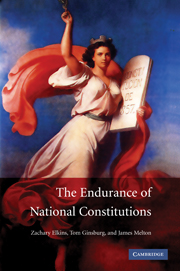Book contents
- Frontmatter
- Contents
- Preface
- 1 Introduction
- 2 How Long Should Constitutions Endure?
- 3 Conceptualizing Constitutions
- 4 What Makes Constitutions Endure?
- 5 Identifying Risks to Constitutional Life
- 6 An Epidemiological Analysis of Constitutional Mortality
- 7 Cases of Constitutional Mortality, Part I: Similar Contexts, Contrasting Outcomes
- 8 Cases of Constitutional Mortality, Part II: Contrasting Contexts, Similar Outcomes
- Conclusion
- Appendix
- References
- Index
- References
4 - What Makes Constitutions Endure?
Published online by Cambridge University Press: 05 June 2012
- Frontmatter
- Contents
- Preface
- 1 Introduction
- 2 How Long Should Constitutions Endure?
- 3 Conceptualizing Constitutions
- 4 What Makes Constitutions Endure?
- 5 Identifying Risks to Constitutional Life
- 6 An Epidemiological Analysis of Constitutional Mortality
- 7 Cases of Constitutional Mortality, Part I: Similar Contexts, Contrasting Outcomes
- 8 Cases of Constitutional Mortality, Part II: Contrasting Contexts, Similar Outcomes
- Conclusion
- Appendix
- References
- Index
- References
Summary
Jeanne Calment was 122 when she died in her lifelong hometown of Arles, France in 1997. No one has ever lived longer, or at least no records can verify anyone having done so. At 117, Calment gave up smoking only after her increasingly poor eyesight prevented her from lighting her own cigarettes. A year later, she took up the habit again, apparently undeterred by any vision problems. Until her death her diet consisted, in part, of chocolate (reportedly two pounds of a week, mostly Swiss) and generous shares of olive oil (eaten directly) and port wine. In any predictive model of human life span, the case of Jeannne Calment lies considerably above the regression line.
The U.S. Constitution is, in our view, something of the Jeanne Calment of higher law. Like Calment, the U.S. Constitution defies expectations, at least according to our model of longevity. The U.S. document embodies many of the elements that we predict should lead to increased mortality rates. Our theory, as described below, focuses on the importance for constitutional longevity of higher than average levels of flexibility, inclusion, and specificity – none of which are in abundance in the Philadelphia creation. There may be good reasons to adopt the Philadelphia model – the constitutional equivalent of cigarettes, chocolate, and wine – but constitutional endurance is not one of them.
A THEORY OF CONSTITUTIONAL RENEGOTIATION
Our theory – call it a theory of renegotiation – involves notions of constitutional formation, adjustment, and endurance.
- Type
- Chapter
- Information
- The Endurance of National Constitutions , pp. 65 - 92Publisher: Cambridge University PressPrint publication year: 2009



